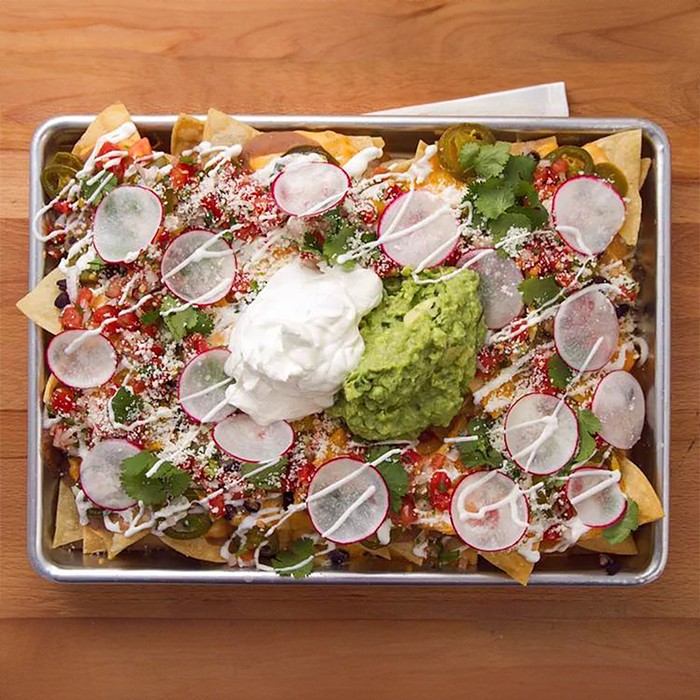Seattle has a po'boy problem. It's the bread. See, the oblong roll that envelops a po'boy sandwich is a means, but some people treat it as an end. It is a vehicle, a warm airplane that flies golden fried oysters (or shrimp or sausage or whatever) along with a proper dressing (sauces, lettuce, tomato, onion, shredded cabbage, or whatever) into your mouth. The po'boy was invented to bypass cutlery, a way for cooks to engineer each bite as a perfect bite instead of forcing eaters to play architect with their ingredients.
The Platonic po'boy roll is a little crisp, breaking away between your teeth instead of mushing like a cheap hot-dog roll—and it should emphatically not be overcrusty or chewy or in any other way draw attention to itself.
This part of the po'boy equation confounds most places in Seattle that serve po'boys—and these days, po'boys are in fashion. Whether it's because people associate Creole cooking with the French or whether it's because Wikipedia claims that a po'boy is served on "baguette-like bread," most po'boys in these parts involve too-crusty French baguettes that require intense mastication and steal the glory of well-fried mollusks and crustaceans. Not too firm, not too soft: The bread should take the middle way.
Matthew Lewis, who learned to cook in New Orleans and opened his Creole soul-food truck Where Ya At just six weeks ago, gets it. "People will throw oysters on a baguette and call it a po'boy loaf," he says. "The bread should accentuate what's in there instead of taking on a life of its own." Yes. Thank you. (Where Ya At gets its name from the New Orleans greeting "Where yat?" which Lewis spells out "Where Ya At" because he thinks it looks better on paper. Locals, usually white folks with a particular New Orleans accent that sounds more like Brooklyn than Baton Rouge, are known as Yats.)
But getting the right rolls wasn't easy. Lewis nearly despaired of finding a bakery that could make what he wanted; he considered flying up his loaves from the famous Leidenheimer Baking Company in New Orleans. (Note that a German immigrant, not a Frenchman or a Creole, set the gold standard for po'boy bread.) At the last minute, some Seattle baker—Lewis won't say who—got it right and saved the day. Lewis's oyster po'boy is $9 of heaven.
According to po'boy legend, two brothers—Clovis and Benjamin Martin—who had worked as streetcar conductors left the lines and opened a sandwich shop. In 1929, when their streetcar brethren went on a bitter strike, the brothers began giving the "poor boys" sandwiches made of leftovers on loaves of bread. The world's greatest sandwich was born.
Seems like every New Orleans dish comes with a good story, including the Peacemaker (or La Médiatrice), a forerunner of the oyster po'boy. According to the James Beard Foundation: "Men out late carousing in the French Quarter brought home the golden toasted loaves hollowed out and stuffed with hot creamed oysters or perhaps buttery fried oysters as a peace offering to their jealous wives." Lewis's Peacemaker ($10) is a little more contemporary, with bacon as well as oysters, cheddar, Mama Lil's spicy-sweet pickles, and a regular roll instead of "golden toasted loaves hollowed out" (though that traditional preparation sounds like a peace treaty to me). I prefer a well-fried oyster to almost anything, but the world is full of people who like bacon and pickles, and Lewis's Peacemaker could be their Versailles.
Another story about polyglot New Orleans, this one from a cookbook by Marie Lupo Tusa, the daughter of the man who founded Central Grocery, home of the muffuletta: "The muffuletta was created in the early 1900s when the farmers market was in the same area as the grocery. Most of the farmers who sold their produce there were Sicilian. Every day they used to come to my father's grocery for lunch. They would order some salami, some ham, a piece of cheese, a little olive salad, and either long braided Italian bread or round muffuletta bread. In typical Sicilian fashion, they ate everything separately... and [they'd] try to eat while precariously balancing their small trays covered with food on their knees." In typical American fashion, Mr. Lupo set to problem-solving: Let a cook engineer the sandwich and stop forcing his customers to. Lewis's muffuletta ($8) is true to tradition, with ham, mortadella, soppressata, coppa, provolone and Swiss cheese, and a house-made olive salad. (Lewis says that nearly everything at Where Ya At, down to the mayonnaise, is house-made.) Lewis makes a smaller muffuletta than Central Grocery's, and unless you're a calorie-starved Sicilian farmer, that's a good thing.
Lewis lived in New Orleans for 18 years, studying premed at Xavier University while falling for the kitchen, where he worked with Frank Stitt, whom Lewis calls "the godfather of gourmet Southern food." What's gourmet Southern food? "You slice thinner, sauté quicker, and cure your own bacon," Lewis says. "Instead of everything in one pot, you deconstruct it on a plate. It still tastes like what grandma would recognize—but you get to charge $12 instead of $2."
At this point, Where Ya At sticks to more traditional Creole food: the po'boy, a satisfyingly smoky gumbo ($8), beignets ($3), and a red beans and rice ($6) with so much tender pork, you'll swear Lewis mixed up your order. ("Those red beans have more pork than a pig!" Lewis says by way of explanation.) But Lewis has a big imagination. He's been in Seattle for nine years, cooking at Canlis, Toulouse Petit, and with Scott Staples at Zoë.
Once he's convinced Seattle that he knows his way around a Creole kitchen—which shouldn't take long—he's going to start experimenting. "People challenge me sometimes," he says. "They say 'soul food' has gotta be fried chicken and collard greens, but it's about cooking from within—your soul food could be different from mine. We're gonna start throwing down some mac and cheese, start braising turkey. The po'boys are fun, but get ready for us to throw some other specials at you."
Lewis adds that he tests all his recipes with his granny, who still lives down in New Orleans. "When I cook for you," Lewis says, "I'm taking you home with me, man."
Amen. ![]()
This article has been updated since its original publication.



















